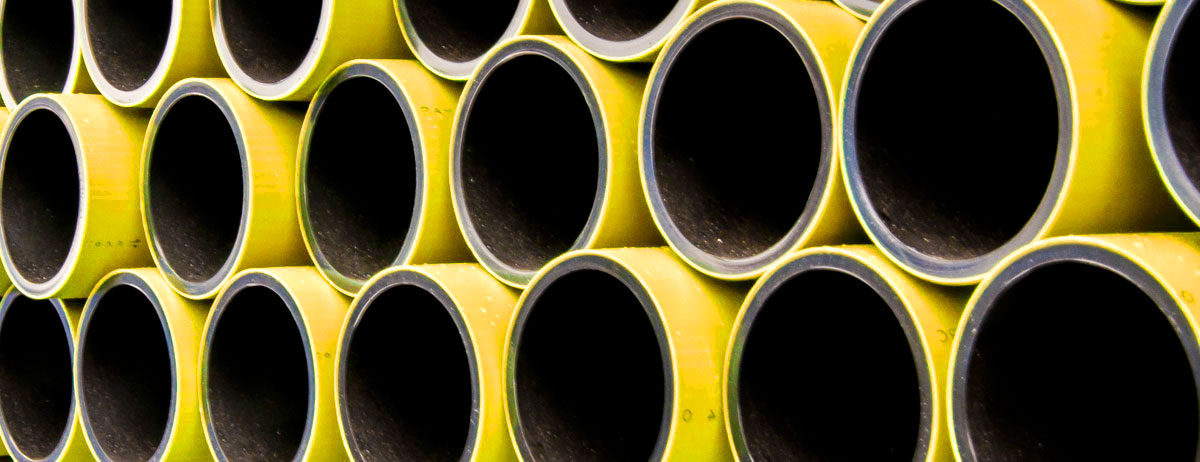
Stiffness
PN 6 - PN 12,5
Diameter
75 - 630 mm
Raw Material
PE-HD, PE 100, PE 100-RC
Technical characteristics:
For the production of segment pipes and fittings, high-density polyethylene, abbreviated as PE-HD, is used. It is a raw material that works well in many pipe applications. It is characterized by high resistance to impact loads that may occur at the stage of pipe laying and a large range of operating temperatures allowing to carry out works at any time of the year.
The subject of the presentation are monolayer pipes made of PE 100 and single-layer or double-layered pipes TYTAN PE/PE and TYTAN PE/PP made of polyethylene PE 100-RC and polypropylene (PP) intended for pressure pipelines (waterworks, gas fuels, pressure and vacuum sewerage) and gravitational (sanitary sewage system, drainage), as well as to make culverts under road embankments laid underground in the road lane.
The TYTAN system consists of:
– Type 1 (single layer) – Polyethylene PE 100, PE 100-RC
– Type 2/2 (two-layer) – PE 100-RC polyethylene pipe
– Type 2/3 (three-layer) – Polyethylene PE 100-RC pipe
– Type 3 (two-layer) – PE 100-RC polyethylene pipe with an additional external protective layer made of PP
– Type 3 PLUS (two-layer) – In addition to the protective layer as in the third type, it also has a detector insert that facilitates pipeline maintenance.
TYTAN pipe tests conducted at the HESSEL Ingenieurtechnik GmbH and at the Oil and Gas Institute in Krakow confirm their resistance to the effects of scratches and point loads that may arise as a result of building the network in the home ground without applying ballast and backfilling and for building and renovating the network using traditional methods and excavation.
Pipe sections depending on the diameter and purpose can be combined by the following methods:
– butt welding
– welding using electrofusion fittings
– connection using clamp fittings
Standards:
EN 1555-2+A1:2013-05 – Plastic piping systems for the transmission of gaseous fuels – Polyethylene (PE) – Part 2: Tubes
EN 1555-3+A1:2013-05 – Plastic piping systems for the transmission of gaseous fuels – Polyethylene (PE) – Part 3: Fittings

Advantages of TYTAN system for gas networks:
The high strength of the material ensures safe assembly in all conditions.
Polyethylene is characterized by high chemical resistance to most chemical compounds.
Thanks to the detection insert, pipeline maintenance is even easier.
PE 100 RC polyethylene pipes are certified in accordance with PAS 1075:2009-04 regarding alternative laying techniques.
TYTAN PE/PE pipes can be joined by butt and electrofusion welding or by compression fittings.
For connection with fittings or pipelines made of materials other than PE, flange fittings, suitable mechanical connectors or PE/steel transition fittings may be used.
TYTAN pipe tests conducted at the HESSEL Ingenieurtechnik GmbH and at the oil and gas Institute in Krakow confirm their resistance to the effects of scratches and point loads that may arise as a result of building the network in the home ground without applying ballast and backfilling and for building and renovating the network using traditional methods and excavation.
PE pipes are delivered in the form of coils (circles) or straight sections palletized into bundles. When transporting and storing pipes and fittings, special care should be taken not to damage them.
The pipes can be stored in the open air for a period of 12 months. If it is expected to be stored for a longer period of time, it is preferable to protect them against the influence of solar radiation (UV) by placing them under a roof. It is necessary to ensure free air flow.

